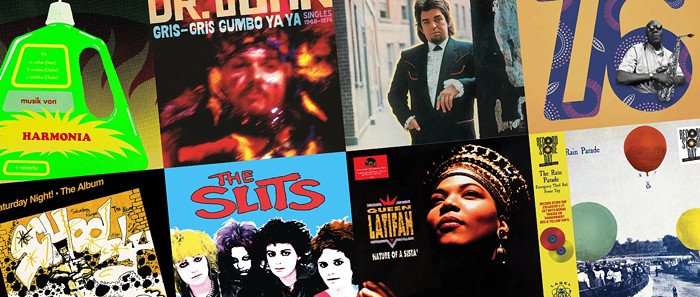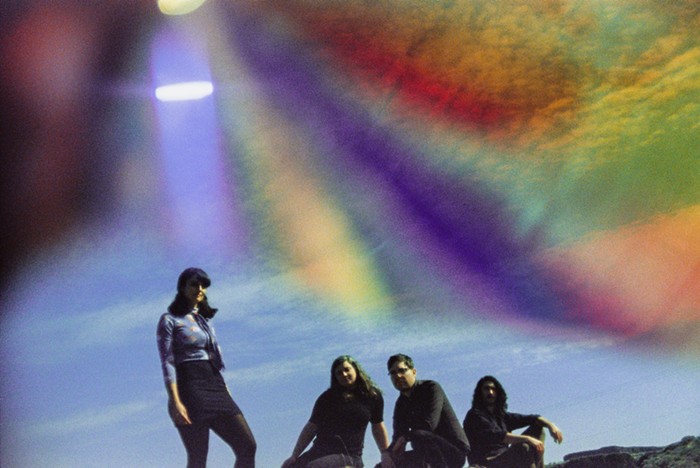This year's SIFF features two showings of the 1928 silent film drama The Wind accompanied by live-score performances from Seattle's plains-rolling seven-piece the Maldives. The film portrays the prairie-town strife of naive and deprived Letty Mason (played by striking silent-film sovereign Lillian Gish). Letty moves from her Virginia home to Sweet Water in the western prairies to live on the ranch of her cousin Beverly, his wife, Cora, and their three children. But Sweet Water, as it turns out, is not so sweet. Cora hates Letty (especially in the beef-carving scene), thinking Letty is there to steal her husband, and all the men are overbearing, overaggressive assholes. Then there's The Wind, the incessant, somewhat demonic wind. Letty is isolated, beautiful, and pained. She's also longing and pure, and you want good to befall her—all facets the Maldives' sound conjures so well. The band's Jason Dodson, Jesse Bonn, and Faustine Hudson broke down some of their scoring process.
How was The Wind chosen as the film to work with? Jason: SIFF asked us to choose a silent western, so I obliged and asked my friend Leo at Scarecrow Video if he had any ideas. He immediately thought of The Wind, and based on his enthusiasm, I implicitly trusted him. I always trust my gut and my friends.
How did y'all go about scoring the music? Jason: We watched the film first and looked for cues, mostly emotional transitions and character traits, then checked if any songs we'd already written would fit those themes. Then we watched the film again and argued a bunch as we played along to it. At some point, the whole thing jelled. Scoring requires work, and more work, and at least a few beers—or in my case, some white wine. We're actually still creating it [laughs]. There's no such thing as a finished product in music, as long as we're playing the piece live. That said, we're extremely intense and highly successful procrastinators.
Faustine: Imagine a seven-piece band, all circled up in the basement, turned the same way, looking at a 15-inch MacBook Pro screen. We watch, jam, chat about the vibe of the scene, and then go back and play it about five more times. J. Daddy Dodson is our band's film nerd. Kevin [Barrans] had to be rewind guy.
How does scoring music for a film break you out of your normal mode of writing? Jason: It really doesn't. The film, in some ways, reveals what already exists in our music. The scoring process gives us focus, so we actively listen to each other and decide what each scene requires.
The Maldives scored music for SIFF's showing of Riders of the Purple Sage a couple years ago. How was it different this time around? Jason: We had more knowledge of what we were getting into this time, so those jitters weren't really present. You really can't score to plot, so in many cases, we score to action, at which point the plot becomes subsequent to what we are actually seeing on-screen, not what can be read in a plot synopsis. Film is sound and vision, remember?
One of the main themes of the movie seems to be that men are creepy, overbearing assholes. Back off, dudes! How did you compose music for the creepy-men-getting-in-her-face scenes? Faustine: Man, I noticed that. Most of the scenes that had Letty and a dude in them, the dude is looking/gawking/groping at her in some G- to R-rated way.
Jason: Lots of minor chords [laughs]. Those men may be creeps, but it is actually Cora who threatens to murder Lillian Gish.
This guy, Wirt—the cattle buyer who meets Letty on the train—he's all up in her face. Dude needs to take his hands off her and back off. Faustine, what's with all the creepy dudes? Faustine: I'm from the Mojave, and I've spent a lot of my life traveling through these small towns. The reality is that these dudes see a new lady and get a little... excited. And because of their lack of social skills, they come off as total CREEPERS—which they probably are in real life because they want to get laid—and this scene, and others, captures that. It's like putting a woman on a fishing boat with a bunch of fishermen and sending it out to sea.
The character Cora seems to be a bit on the cold-hearted-bitch side of things. What's her music like? The Rolling Stones' "Bitch" perhaps? Or Paula Abdul's "Cold Hearted"? 'Cause she don't play by rules. Jason: Cora's just protecting what she feels is hers in a harsh, unforgiving landscape. The film doesn't really allow her any sympathy. I actually like her, but since she is a tool for violence, we give her a violent score—heavy guitars and plodding rhythms.
Jesse: For Riders of the Purple Sage, we had music themes that represented character and action. In The Wind, the characters and actions are more complicated, and it seemed more appropriate to tailor the music to the mood.
Let's get into the wind aspect. What does the wind represent? What is your wind sound? Faustine: The wind seems to be something that really bothers the gals. And Letty always seems to have the wind around when some sort of conflict is happening. We gave it something distinctive [laughs].
Jason: We've been approaching the wind as a kind of Lynchian mental state. It pervades Gish's psyche and eventually takes over what is happening on-screen. Adam created a crazy industrial distortion on his keyboard for the wind. It is creepy, and cool.
When y'all disagree, how do you resolve it? Jason: Taking a time-out and talking about it usually resolves it. This is usually preceded by someone attempting to be louder than everyone else [laughs].
Jesse: Rock, paper, scissors.
Faustine: For the most part, we had similar ideas in regards to what worked. Whenever there was disagreement, we would just look to The Wind for the answers.
What's with the crazy look the characters keep giving? That wide-eyed, oh-my-god-it's-a-monster look? Jesse: Reefer Madness.
Jason: I'm pretty sure that's just an antiquated acting style. Way before Marlon Brando brought the Method to the screen. Some people still act this way. Watch Amélie and you'll see what I mean.
What do you use for the sound of Letty's gunshot? What about the cyclone? Jason: We are not doing Foley here. So no gunshot sounds. The cyclone is a combo of heavily distorted electric guitars, percussion, and keyboards.
Faustine: The gunshot is a flag that comes out that says BANG.
Jesse: The sound of the cyclone is distorted angry bees [laughs].
Does Letty really love Lige in the end? Jason: If she says so, then yes. The original ending had her wandering off to her own death in the desert. I suppose the movie producers thought that was too dark, so they decided to lighten it up a bit. Love rules.
"The wind can remove traces when a killing is justified" is one of the movie's messages. What's the tune like for that one? Jason: It's triumphant, but immediately goes back to the minor chords of Cora's theme, suggesting an underlying disease, and then the movie ends.
What are some film scores that you all think are effective? What should we check out? Jason: Anything by Ennio Morricone or Carter Burwell. Neil Young's score for Dead Man. Nick Cave and Jonny Greenwood have been doing interesting work. If you haven't heard David Wingo's score for Mud, then you really need to get out to the movies.
Faustine: E.T.—the four-disc LP set. It came with a big poster of Michael Jackson and E.T. cuddling.
Jesse: The Master, Thunderball, Once Upon a Time in the West, and Star Wars.
Did the fact that Smashing Pumpkins named their album after Lillian Gish affect any of your sonic decision-making? Are y'all Smashing Pumpkins fans? Jesse: Yes, it did, and yes, we are Smashing Pumpkin fans. Gish and Siamese Dream were important albums in our youth. Smashing Pumpkins were great at weaving sound texture and distortion into pop-rock songs.
How many times during the scoring process did you look at Kevin Barrans's beard and think, "God, it's so abundant and silky, you could land a floatplane on it?" At least twice, right? Faustine: Every time I look at Kevin's perfectly groomed, two-foot-long beard, my imagination runs wild. I think about that beard being some other land that a really small, magical colony lives in, with fairies and butterflies and little warriors like in the movie Willow—all living in that beard in an amazing tree house. ![]()


















